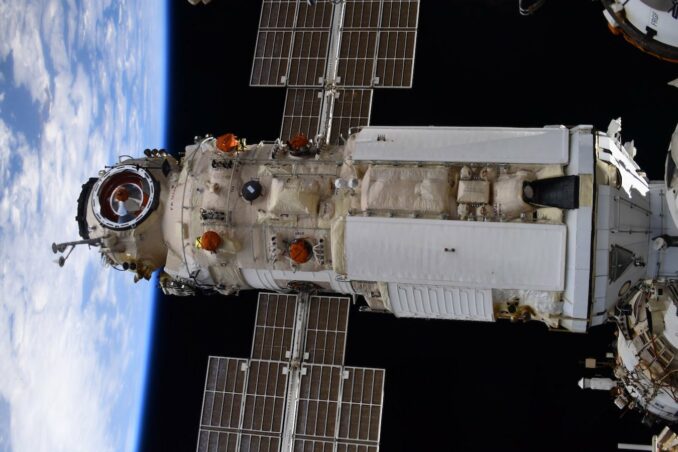 File Photo of the Nauka module at the International Space Station. Credit: NASA/Shane Kimbrough
File Photo of the Nauka module at the International Space Station. Credit: NASA/Shane Kimbrough
An apparent exterior coolant leak from a Russian laboratory module at the International Space Station has been reported by the crew. It follows similar leaks that struck a Russian Soyuz crew ferry craft and a Progress cargo ship within the past year.
This latest incident was reported by Mission Control Center at NASA’s Johnson Space Center in Houston to NASA space station crew member Jasmin Moghbeli around 1 p.m. EDT (1700 UTC).
“We’re seeing flakes outside. Need a crew to go to the cupola, look toward the aft side, we think windows five or six, and confirm any visual flakes,” mission control requested.
Moghbeli, the commander of the SpaceX Crew-7 mission and current ISS flight engineer, said she would go check it out herself. She was asked if she could confirm the point of origin, since it was difficult to see that from the ground perspective.
“Yeah, there’s a leak coming from the radiator on the MLM,” Moghbeli said.
The MLM is the Multipurpose Laboratory Module, also called “Nauka.” It’s the newest module of the space station, having launched on a Russian Proton rocket on July 21, 2021.
“We copy and we think we concur. We just confirmed it with video and they’re seeing it here on the ground,” Mission Control replied. “Jaws [a nickname for Moghbeli], can you please close the cupola shutters?”
Less than a minute later, Moghbeli confirmed the shutters were closed. This was presumably to prevent the surface of the windows being contaminated by the leaking coolant. About 20 minutes after that, ISS Commander and European Space Agency (ESA) astronaut Andreas Mogensen confirmed to Mission Control that the gym and lab shutters on the U.S. side of the space station were also closed.
NASA has not yet made an official comment regarding the leak.
This is a developing story. Check back for updates.
>>> Read full article>>>
Copyright for syndicated content belongs to the linked Source : Spaceflight Now – https://spaceflightnow.com/2023/10/09/leak-detected-onboard-russian-segment-of-international-space-station/










